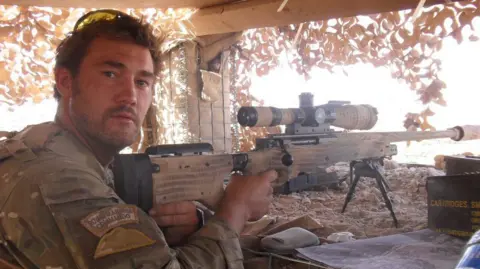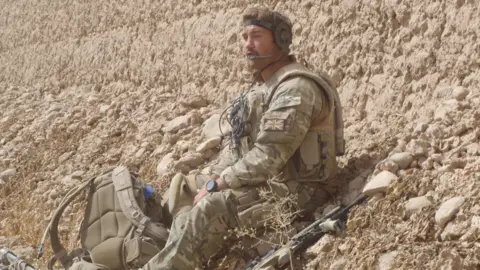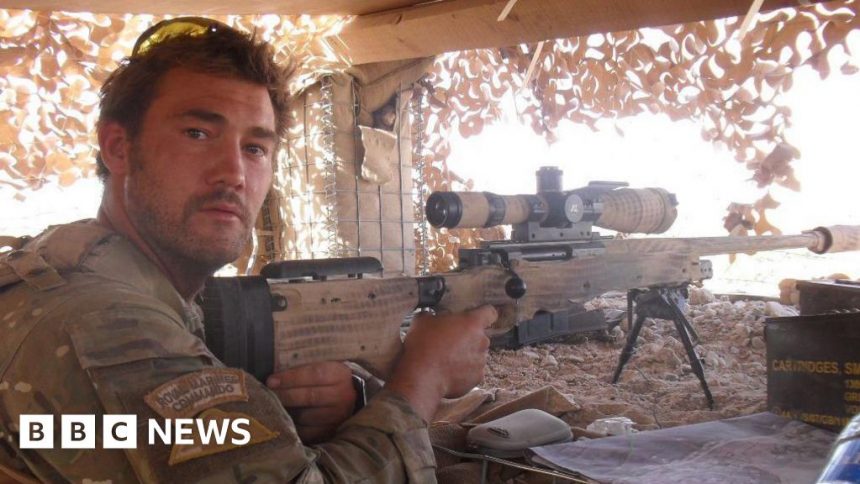MoD to compensate thousands of veterans over hearing loss
 Barney Barnett
Barney BarnettThousands more ex-servicemen and women will receive compensation for hearing loss suffered during training or combat, the BBC has learned.
Military personnel are repeatedly exposed to loud noises, such as gunfire and bombing, during their careers.
The Ministry of Defence (MoD) has opposed many claims made by veterans experiencing hearing loss, arguing other sources of noise were to blame, individuals should have worn protection or their claims were too late.
Now it has accepted exposure to noise in the military has been a cause of hearing loss and that people discharged after 1987 could be eligible for compensation.
The MoD has been approached for comment.
Between 2012 and 2020, the MoD paid £72m in compensation for military hearing loss, settling more than 9,000 cases.
But it is likely this new court agreement will result in many more service people receiving payments, with up to 10,000 currently making claims.
 Barney Barnett
Barney BarnettSimon Ellis, from Hugh James solicitors, who is representing nearly 5,000 military personnel, called the development “ground-breaking”. His firm expects many more claimants to come forward.
“[Veterans] have had their careers prematurely ended, other employment opportunities denied to them, and their personal lives irrevocably changed,” he said.
“People who put their lives on the line in the service of our country should expect that they are not put in additional unnecessary danger by their employer.”
In a case last year which paved the way for the new scheme, James Barry, who is in his 30s, was awarded £700,000 after developing hearing loss and tinnitus.
The MoD accepted it had a “duty of care” to veterans and abandoned its argument that claims should have been brought sooner.
Barney Barnett, a 44-year-old ex-commando who joined the Royal Marines aged 16, also suffers from tinnitus and finds it hard to understand people when there is background noise.
“It affects me every day, I tend not to moan about it, I just get on with it,” he told the BBC.
Mr Barnett served in Iraq and Afghanistan where he went on patrols from forward operating bases and was repeatedly involved in combat, sometimes as a sniper team commander.
He told the BBC he had fired or been attacked with weapons including rifles, grenades, general purpose machine guns, light machine guns, 50 calibre machine guns, anti-tank missiles, mortars, and bombs.
Videos he shared from conflicts abroad capture the roar of armoured vehicles or helicopters landing, punctured by constant gunfire.
In one picture he can be seen wearing small earplugs, but he said that was a rare occurrence. He says he was either not given hearing protection or he was not able to wear it for operational reasons.
“If you get engaged by the enemy, whether that’s an IED, whether that’s indirect fire, whether it’s a burst of automatic fire, the last thing you have time to do is think about your hearing,” he said.
“Your main concern is those on the ground with you. Staying alive.”
 Barney Barnett
Barney BarnettIn 2014, Mr Barnett went before a military board and it was decided he was medically unfit to continue in the Royal Marines because of noise-induced hearing loss.
He struggled to find work in civilian life and served briefly with MI5 before an assessment deemed him unsuitable due to his poor hearing.
He is now an operations manager in a security firm but must avoid loud environments such as concerts.
Mr Barnett’s attempts to claim compensation began seven years ago and he hopes the new legal agreement with the MoD means it will now be resolved quickly.
He says compensation would help him buy more advanced hearing aids and allow his life to move forward.
“People don’t see what we’ve been through,” he said.
“We’ve done our battling, we’ve been on operations, we’ve come home.
“The government speeding this whole process up, as opposed to battling it out in court, will mean the world to people.”
The military introduced hearing protection in the 1970s but Nicholas Hill, an acoustics engineer who has given evidence in many cases, says it was difficult for soldiers to wear all the time.
He said “every firearm ever made, if you fire it with unprotected ears, just once, can damage hearing”.
 Barney Barnett
Barney BarnettA handful of cases will go to trial next year, to determine the level of compensation veterans should receive.
Hugh James solicitors said after this is decided, any claimants will be able to resolve their cases without the need to go to court, if they can show their hearing loss resulted from service in the military.
They must have served at some point after 1987 when a change in the law suspended legal immunity for the government in cases involving service personnel.
The MoD agreement follows negotiations led by Hugh James solicitors and allows the government to continue fighting cases brought by other law firms, although sources close to the case believe this is unlikely to happen.







